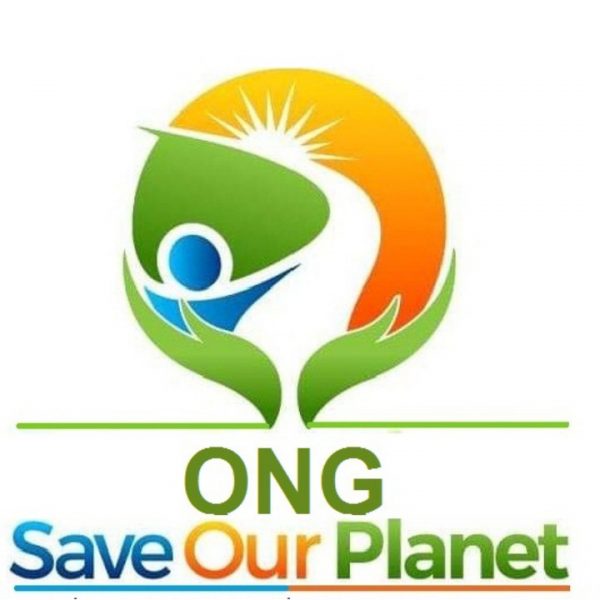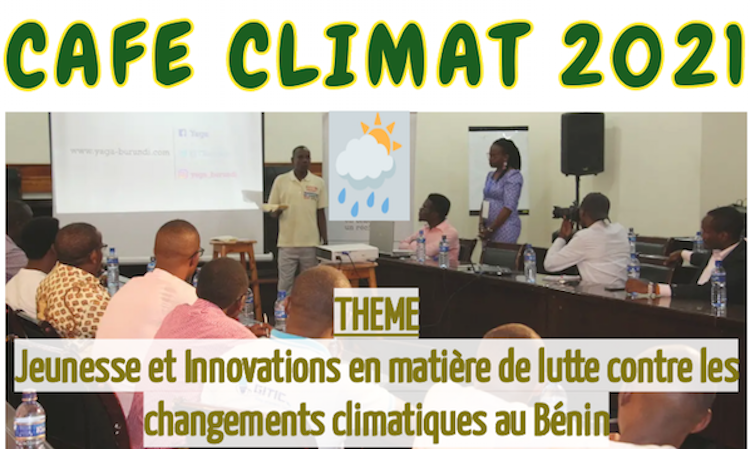Climate Café
To protect the environment in Benin, the NGO Save Our Planet has decided to create Climate Café, a project that aims to involve young people, not only in the search for innovative solutions to combat climate change, but also to support their participation in local governance in this area.


Overview of the project
The Climate Café project provides a framework for reflection, action and the promotion of initiatives to fight against climate change. It aims to involve young people from Benin’s rural and urban communities in all local actions to combat climate change.
Launched in 2020, this annual event is characterised not only by a conference setting that encourages debating on a current local climate issue, but also by training, networking, experience and opportunity sharing between the actors present and the young participants.
Its participatory and interactive format welcomes about a hundred young people each year, with about fifty in the North and fifty in the South of Benin. These young people are selected via a call for applications on the principle of gender equality, in all rural and urban communities of Benin. They get training to gain skills on a specific climate theme, then exchange ideas with different thematic groups, while also reporting on environmental problems specific to their environment, and proposing solutions.
The aim is to involve young people from rural and urban communities in Benin in the search for innovative solutions to combat climate change.
Ongoing research
11/01/2020 - 11/01/2030
- During the first edition, a hundred young people throughout the country were trained in environmental blogging, a method of eco-citizen participation. These young people in the north and south of Benin were given the tools to create and run blogs to denounce or promote facts with environmental impacts, including mobilisation to provide solutions to problems that are reported whenever possible, or to involve the local authorities. Twenty-seven blogs were created and animated by the young participants, sentinels of environmental protection.
- The second edition, established on the theme of Youth and Climate Innovation in the fight against climate change, mobilised around one hundred young people from the south to the north. Six (06) innovative solutions were popularised / made accessible for understanding to the young participants: namely, the production of ecological coal, the production of gas through waste, the recycling of electronic waste, the carpooling initiative, and organic and ecological production.
- The young people, whose capacities were strengthened through better understanding, exchanged and shared opinions on the overall situation, and on perspectives from the different communities in Benin in regards to their fight against climate change.
- The young people also submitted a non-exhaustive list of some thirty problems, including the poor handling of gases by refrigeration workers, dredging of sand in wetlands, the abusive use of chemical elements in agriculture, the poor management of household waste and the recurrence of the hidden practice of blocking the rains.
- Several proposals and recommendations were addressed to the local authority for better local governance in the fight against climate change. The young people were divided into ten (10) groups of five members to conduct the following activities: a health and hygiene operation, raising awareness for refrigeration workers, a reforestation operation in their neighbourhood, or village of origin.
- In the second edition, young people received training in motivation and leadership in climate innovation. They discovered several tools for designing climate solutions based on digital technology.
- The participants were divided into several thematic groups, namely: Sustainable Agriculture, Sustainable Ecosystem, Sustainable Energy, Health-Climate ; they had to not only identify innovative solutions capable of countering the problems linked to each field in their living environment, but also learn how to take advantage of the climate situation. After the Climate Café, these groups are now working to implement their solutions in agreement with the local authorities.
This project is financed by Save Our Planet's own funds with some logistical support from some sister organisations that share the same values and goals.
organisation
The NGO Save Our Planet is an organisation of young people who are passionate, specialists, and committed to the fight against climate change in Benin. This young organisation was created on 05 June 2019, registered under 2021/No5/001/PDC/SGD/SAG on 18 January 2021, and published in the Official Journal of the Republic of Bénin, No5 of 1 March 2021, page 328. Its goal is to contribute to the protection of the environment in Benin.
The NGO Save Our Planet promotes eco-tourism through an eco-committed youth camp rooted in the fields of climate, biodiversity, sustainable energy, water, and sanitation. It is about discovering the landscape of the hills in central Benin, and to identify and locate endangered species in order to propose and conserve the biological diversity of the hills. Through its project, Green Footprint for a Sustainable City, it contributes to the restoration of the ecosystem through the greening and reforestation of endangered forest and fruit species, throughout public spaces, schools, and universities in the main cities of Benin.
Known as one of the young organisation’s flagship projects, the Climate Cafe project involves around 100 young people from rural and urban communities in climate change decision-making in Benin each year. The NGO Save Our Planet is also active in the recycling of plastic and electronic waste. It is positioned as an organisation that makes environmental education and advocacy a priority in the dynamics of ecological transition.








